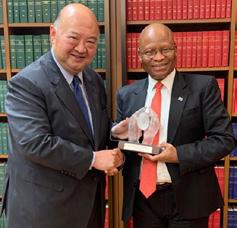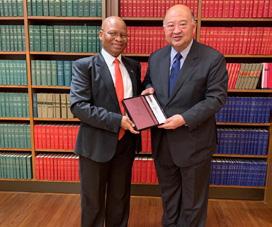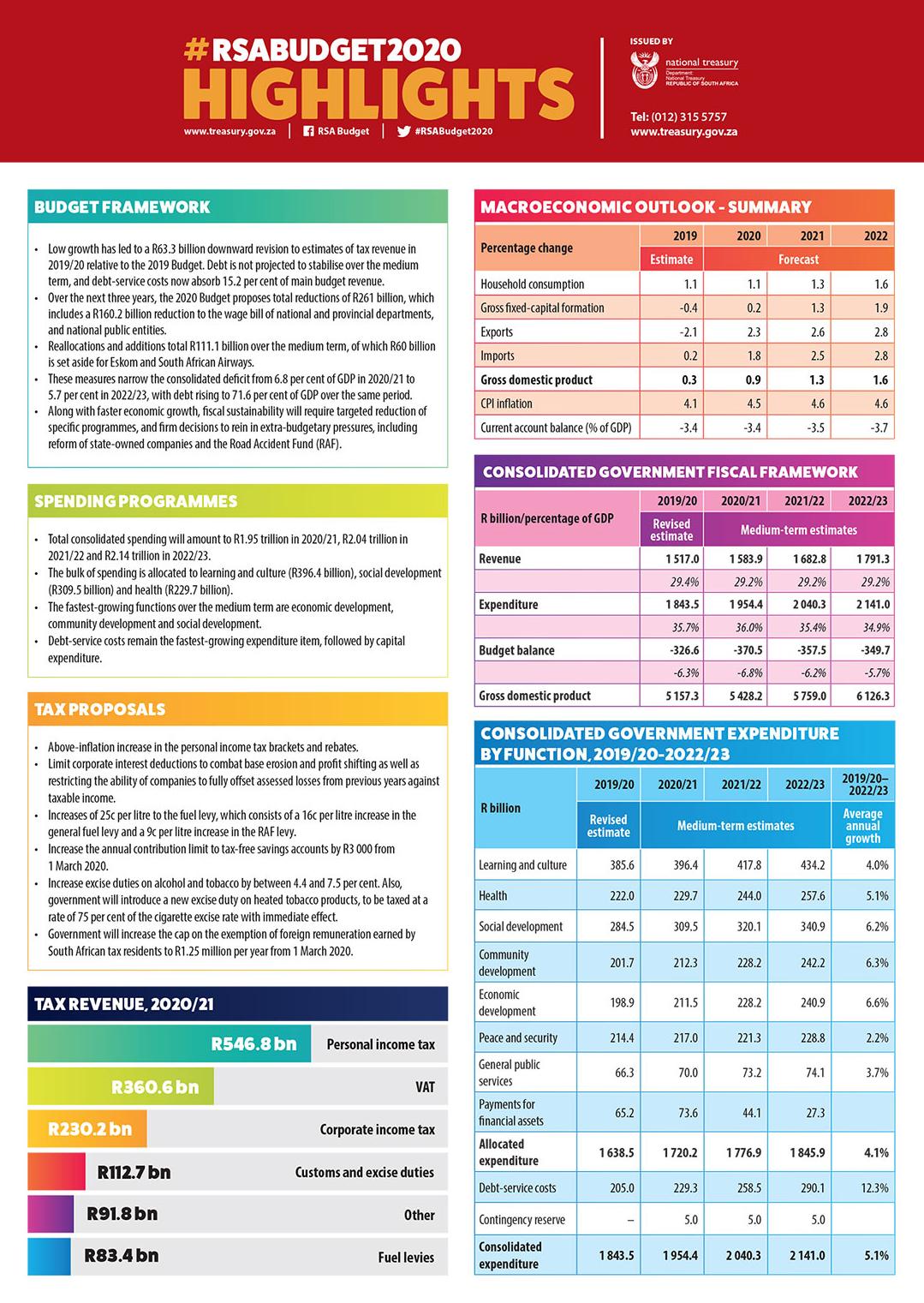
17 minute read
Check to see if the person is wearing a medical bracelet or other emergency information
JOINED: NOVEMBER 2019
MS NQOBILE DLAMINI
Advertisement
DIRECTOR: Capacity and Organisational Development
Nqobile hails from the Zulu Kingdom in Umlazi, the fourth biggest township in SA by population. She joined the OCJ on 1 November 2019 following a five year stint at the KZN Department of Community Safety and Liaison where she was Director: Corporate Services.
In her own words, her role in the OCJ is “ensuring that the Department’s employees are fully capacitated with relevant skills that will enable them to perform at their full potential.” Nqobile holds a Diploma in Human Resources Management (Mangosuthu Technikon), a Bachelor of Technology in Human Resources Management (ML Sultan Technikon), a Postgraduate Degree in Labour Law (University of Johannesburg) and a Certificate in Government Communications and Marketing (University of Witwatersrand).
She’s currently studying towards an MBA with the University of KwaZulu-Natal.

JOINED: DECEMBER 2019
ADV. DAROL HOLBY
DIRECTOR: Employee Relations
Darol joined the OCJ on 1 December 2019, bringing with him a wealth of skills, knowledge and experience relating to Public and Labour Laws in the Public Sector including having personally experienced working in our courts over an extensive career as a legal practitioner for over 25 years. His work has taken him to many places and has managed and resolved workplace conflict in eleven countries.
This gentleman from the City of Choice, Pietermaritzburg, has held senior positions at Transnet, the Department of Trade and Industry, the Department of Water Affairs and Forestry as well as the Department of Public Enterprises. Before joining the OCJ, he had taken up a position of Legal Specialist heading up a newly created legal division responsible for managing the support to State Capture Commission.
He holds a Bachelor of Arts (University of KwaZulu-Natal), a Bachelor of Laws (University of the Western Cape) and has completed numerous short courses. He was admitted as an Advocate on 6 April 2004. He promises ‘an open door policy that will never be judgemental but always willing to hear all sides of the story’ for the duration of his three-year tenure at the OCJ.

JOINED: JANUARY 2020
MS LILLIAN KWINIKA
An innovative leader who is open to new ideas. This is the one thing, if nothing else, that Lillian wants all of us to know about her. Lillian joined the OCJ on 2 January 2020 from the Department of Tourism, bringing with her thirteen years of experience in human resource management.
She describes her role at the OCJ as ensuring an effective and efficient operation of the Human Resources Practices and Administration unit to achieve the OCJ’s objectives and strategies’. Her strengths, as she describes them, are her transformational leadership style that inspires positive change, as well as respect for all regardless of rank.
She is a Tshwane University of Technology (B-Tech Knowledge Management) and Unisa (Master of Business Leadership) graduate. She also holds numerous development certificates from various institutions.

JOINED: JANUARY 2020
MS ZURIKA PIENAAR
Zurika has been entrusted with the responsibility to lead the administration of one of the busiest High Court Divisions in the country, the Western Cape Division of the High Court. She resumed her responsibility on 2 January 2020.
Before joining the OCJ, Zurika worked for the Department of Justice and Constitutional Development, as an Area Court Manager stationed at the Umlazi Magistrate’s Court, responsible for seven courts. Zurika says she sees her work as a calling. “I approach my work with big responsibility and passion. I constantly set goals for myself and strive to achieve them. My appointment at OCJ is a huge responsibility to ensure the optimal performance from the courts so that the courts can proceed without any hassles and hindrances, so that justice will be served,” she says.
She holds a Bachelor of Administration degree obtained from Unisa as well as a National Diploma in Service Excellence and Court Management from Regenesys.
AVOIDING THE HOOK DURING PHISHING

Receiving a phishing email can be a bit scary. Fortunately, nothing infects your computer if you don’t click on any links or reply to the email. Here’s what to do (and what not to do) if you receive a phishing email.
In a phishing email, the sender tries to get you to click on a link or provide personal information, like bank details or passwords. They are a conventional social engineering attack.
Just because a phishing email lands in your inbox, it doesn’t mean your computer is infected with a virus or malware. to see if the message is legitimate. Do not reply to the email. If it appears to be from someone you know, create a new email message, or text or call the person and ask if they sent you the mail. Don’t forward the email, as that just spreads the potential phishing attack.
If the email claims to be from a company you use, like your bank, gym, medical institution, or online retailer, go to their website and contact them from there. Again, do not click on any links in the email. Type in the website address yourself (or use your preferred search engine) and use their contact options to ask the company if they sent it out.
Phishing emails are a genuine security risk, though. You should never click on a link in an email or open an attachment to one unless you are 100 percent confident you know and trust the sender. You should also never reply to the sender – even to tell them not to send you any further mail.
Phishers might send emails to thousands of addresses every day, and if you reply to one of their messages, it confirms your email address is live. This makes you even more of a target. Once the phisher knows you’re reading his emails, he’ll send more attempts and hope one of them works.
Report it to your organisation
If you receive a phishing email at your work address, you should follow your organisation’s policy rather than doing anything else.
To access the OCJ’s ICT Policy, please follow this link: http://ocj000-intranet/index.html
If a suspicious email appears to be from someone you know or a company you use, check with them
4 Source: How-To Geek

BERLIN, GERMANY



Chief Justice Mogoeng Mogoeng met with Mr Christian Lange, the Parliamentary Secretary of State in Berlin, Germany (left) as well as with Mr Stephen Harbarth, the Vice President of Federal Constitutional Court of Germany, who made a special trip to Berlin from Karlsruhe to meet with the Chief Justice (right).
30 January 2020
20 TH INTERNATIONAL CONFERENCE OF CHIEF JUSTICES OF THE WORLD - LUCKNOW, INDIA
Chief Justice Mogoeng Mogoeng addressed the meeting of Chief Justices of the world in Lucknow, India.
6 - 12 November 2019
Chief Justice Mogoeng Mogoeng attended the 12th session of the Executive Bureau of the CCJA in Luanda ANGOLA from 22-24 January 2020.
22 - 24 January 2020

HONG KONG, CHINA Chief Justice Mogoeng Mogoeng on a working visit to China, met with Chief Justice Geoffrey Ma Tao-li, the Chief Justice of Hong Kong.
December 2019

SONA IN NUMBERS 13 February 2020
Anniversary
30
years since Nelson Rolihlahla Mandela walked out of the gates of Victor Verster Prison.
Education
2.4 million
children in Early Childhood Development and pre-school
81%
learners who passed matric in 2019.
200
schools to receive coding and robotics in Grades R to 3 by 2022.
550
schools providing various technical vocational specialisations.
720 000
students who received state funding for Technical and Vocational Education and Training colleges and universities in 2019.
10
age of children to be able to read for meaning.
67
schools currently piloting the occupational stream.
09
New Technical and Vocational Education and Training college campuses being built this year.
12th
South African Sign Language to be the 12th official language.
Health
6.8 million
South Africans who know their HIV status.
5 million
People who have been initiated on antiretroviral treatment.
4.2 million
People whose HIV viral load is undetectable.
1 200
medical graduates from the Nelson Mandela Fidel Castro Medical Training Programme in Cuba.
640
medical students of the Nelson Mandela Fidel Castro Medical Training Programme in Cuba expected to graduate in December 2020.
44 million
people registered in the electronic Health Patient Registration System at over 3 000 clinics.
3 000
clinics which registered 44 million people in the electronic Health Patient Registration System.
Energy
3 -12 months
period to initiate the procurement of emergency power from projects that can deliver electricity into the grid.
Transport
Transport Over a million
commuters being transported by the rail network daily to and from work.
120 days
within which the National Energy Regulator will process all applications by commercial and industrial users to produce electricity for own use above 1 MW.
3
Eskom’s operating activities – generation, transmission and distribution – to be divisionalised.
R1.4 billion
cost of refurbishing and upgrading the Central Line in the Western Cape and the Mabopane Line in Pretoria to provide, a safe, reliable and affordable service.
Water
5
years it took previously to process water use licences.
90
days within which water use licences are now issued.
Police
Infrastructure
R1.6 billion
amount reprioritised to support an emergency action plan until the end of the current financial year.
Over R700 billion
potential investments to public infrastructure sectors over the next 10 years.
37 000
rental apartments to be constructed through private investment.
R64 billion
money to be spent over the next years in student accommodation.
R9 billion
private investment in the construction of 37 000 rental apartments.
350 000 - 500 000
future residents of a new smart-city taking shape in Lanseria within the next decade.
50
kilometres of experimental road stretches to be piloted as part of an alternative rural roads programme.
Youth and Women empowerment
1.2 million
young people who enter the labour market each year.
06
priority actions of the Presidential Youth Employment Intervention over the next five years to reduce youth unemployment.
3 million
young people to benefit from prototype Presidential Youth Employment Intervention sites in five provinces.
1%
part of the budget to deal with the high levels of youth unemployment.
1 000
young entrepreneurs receiving grant funding and business support from the National Youth Development Agency and the Department of Small Business Development in the next 100 days.
100
days in which 1 000 young entrepreneurs will receive grant funding and business support from the National Youth Development Agency and the Department of Small Business Development.
100 000
young entrepreneurs to access business skills training, funding and market facilitation over the next three years.
R10 billion
own and partner funding by the Industrial Development Corporation for womenempowered businesses over the next five years.
Investment and jobs
70
companies which made investment commitments of R364 billion at the second South Africa Investment Conference in 2019.
R9 billion
investment value of completed projects.
Transport Land reform 400
containers with under-invoiced products seized in the last quarter of 2019.
R364 billion
investment commitments made by 70 companies at the second South Africa Investment Conference in 2019.
27
projects worth over R250 billion in implementation phase.
R664 billion
investment commitments raised in the first two years of the investment drive.
R250 billion
value of 27 projects in implementation phase.
54 000
jobs to be saved through the Poultry Master Plan to support chicken farmers and processors.
R1.2 trillion
target of investment in the next five years.
121 000
new jobs in the retail-clothing textile and footwear sector over the decade.
44 000
hectares of state land released for the settlement of land restitution claims.
700 000
hectares of state land to be released for agricultural production in 2020.
Local and Provincial Government
40
municipalities receiving support from government.
23
new districts as part of the expansion of the District Development Model.
ISSUED BY:
Government Communications
MORE FROM:
Government Communication and Information System (GCIS)


AWARENESS

CANCER-PREVENTING LIFESTYLE TIPS
World Cancer Day is celebrated each year on the 4th February, where we recognise that our commitment to take responsibility for our own actions and choices will lead to powerful progress in reducing the global impact of cancer.
Organised by the Union for International Cancer Control (UICC), in keeping with this the theme for 2020 is still: I AM AND I WILL, an empowering call to action representing the power of every individual to play their part in helping to end the injustice of preventable suffering from cancer.
Take charge by making lifestyle changes such as these to reduce your own risk. The Mayo Clinic puts forward the following cancer-prevention tips. 1. Don’t use tobacco “Smoking has been linked to various types of cancer — including cancer of the lung, mouth, throat, larynx, pancreas, bladder, cervix and kidney. Chewing tobacco has been linked to cancer of the oral cavity and pancreas.”
2. Review your diet -Eat more fruits, vegetables and plant based foods, such as whole grains and beans. -Cut back on refined sugars and fat from animal sources, especially processed meats. -Avoid drinking alcohol, or only do so in moderation. Alcohol consumption has been linked to increasing the risk of various types of cancer, including breast, colon, lung, kidney and liver. 3. Be more physically active “In addition to helping you control your weight, physical activity on its own might lower the risk of breast cancer and colon cancer. As a general goal, include at least 30 minutes of physical activity in your daily routine — and if you can do more, even better.”
4. Minimise sun exposure Skin cancer is one of the most common kinds of cancer, but it is also the most preventable. Try to avoid midday sun and stay out of the sun between 10 pm and 4 pm when the sun’s rays are strongest. When outdoors, wear a hat and sunglasses and try to cover as much of your skin as possible. For exposed areas of the body, make sure to apply a broad-spectrum sunscreen with an SPF of at least 30, even on cloudy days, reapplying every 2 hours.
5. Get vaccinated Cancer prevention includes protection from certain viral infections. Talk to your doctor about vaccination against: Hepatitis B (which can lead to liver cancer) and Human papillomavirus (HPV), a sexually transmitted virus that can lead to cervical and other cancers.
6. Avoid risky behaviours. That is, practice safe sex, don’t share needles etc. in order to prevent infections (such as those mentioned above) that in turn might increase the risk of cancer.
7. Get your health in check Depending on your age and risk profile, doing self-exams and getting screened for various types of cancers can increase your chances of early detection, when treatment is most likely to be successful. It’s best to discuss this with your doctor.
“We need your commitment to create a cancerfree world. This World Cancer Day, who are you and what will you do?” – UICC.
MEDICAL CONDITION

EPILEPTIC FIT – WHAT SHOULD YOU DO?
The second Monday in February marks International Epilepsy Day, a special event which promotes awareness of epilepsy in more than 120 countries each year. According to the Epilepsy Foundation, “despite being one of the world’s oldest known medical conditions, public fear and misunderstanding about epilepsy persists, making many people reluctant to talk about it.”
Having said that, more often than not, “the misconceptions and discrimination can be more difficult to overcome than the seizures themselves.” For this reason alone, talking about what you can and should do in the case of dealing with someone who is having an epileptic fit, is surely fitting, especially come the 10th February 2020.
Did you know? About 1 out of 10 people may have a seizure during his or her lifetime.
It can be frightening witnessing someone with epilepsy having a seizure, but most seizures aren’t an emergency and usually stop on their own. Although there isn’t much you can do to stop a seizure once it starts, there are a few simple steps you can take to protect someone from harm during an epileptic fit.
WebMD offers the following First Aid tips: 1. Keep other people out of the way. 2. Clear hard or sharp objects away from the person. 3. Don’t try to hold the person down or stop the movements. 4.
5.
6.
7. Place the person on to his/her side, to help keep the airway clear and loosen ties or anything that may be tight around their neck. Look at your watch at the start of the seizure, to time its length. Don’t put anything near the person’s mouth. Contrary to a popular myth, you can’t swallow your tongue during a seizure. Check to see if the person is wearing a medical bracelet or other emergency information.
It is important to stay with the person until the seizure ends and he or she is fully awake. Then help the person to a safe place and explain to them what happened.
According to the Centers for Disease Control and Prevention, it is only necessary to call for emergency medical attention if one or more of these situations apply:
‑“The person has never had a seizure before.
‑The person has difficulty breathing or waking after the seizure.
‑The seizure lasts longer than 5 minutes.
‑The person has another seizure soon after the first one.
‑The person has a health condition like diabetes, heart disease, or is pregnant.”
Seizures are common and it is likely that one day you might need to help someone who is having a fit. It is important to learn what you can to help keep that person safe until the seizure stops by itself.
SECURE YOUR INFORMATION
QUICK TIP: OPERATION CLEAN DESK

Sensitive information on a desk such as sticky notes, papers and printouts can easily be taken by thieving hands and seen by prying eyes. It is advisable that the only papers that should be left out are ones relevant to the current project you are working on. All sensitive and confidential information should be removed from the desk at the end of each working day. During lunch or any emergency departure during office time, all critical information should be placed in a locked desk drawer. Lock your computer too every time you step away from it. ALL CRITICAL INFORMATION SHOULD BE PLACED IN A LOCKED DESK DRAWER 4 Source: Infosec Institute

MR ARTHUR NGCOBO Passed away on - 15 November 2019 Security Officer at the Durban High Court


MS ZELDA MAHOA Passed away on - 14 December 2019 Registrar’s Clerk at the Gauteng Local Division

MR GAMAT SALIE ABRAHAMS Passed away on - 30 December 2019 Registrars Clerk at the Durban High Court

MS MARTHIE VAN GREUNEN Passed away on - 10 January 2020 DCRS Clerk at the Northern Cape Division of the High Court (Kimberley)
NATIONAL OFFICE CONTACTS

NATIONAL OFFICE ADDRESS:
188 14th ROAD NOORDWYK MIDRAND 1685
SWITCHBOARD NUMBER
010 493 2500





